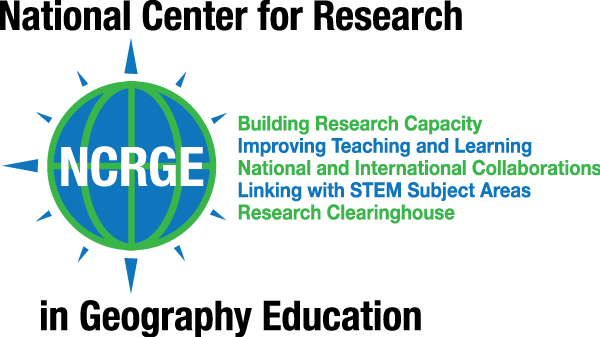NCRGE Funds Research Networks on Geography and Civics, Geo-Computation, and International Curriculum Research
The National Center for Research in Geography Education (NCRGE) has approved awards for a third cohort of grantees under its Transformative Research grant program. This investment by NCRGE continues a long-term and broad-based effort to develop a research coordination network supporting implementation of the Road Map for 21st Century Geography Education project’s landmark report on geography education research.
NCRGE funds research planning and networking activities to strengthen geography education research processes and promote the growth of sustainable, and potentially transformative, lines of research. Through this program, NCRGE is building capacity for research in areas that the Road Map Project determined to be highly significant for achieving broad-scale improvements in geography teaching and learning.
The third cohort of Transformative Research grantees will begin their research planning and networking activities in July 2018. One research group, under the direction of Rebecca Theobald (University of Colorado Colorado Springs), will focus on geography and civics education in the context of decennial procedures of apportionment and redistricting at the federal level, which will next take place following the 2020 Census. In this project, researchers will expose multiple audiences to geographic concepts and skills using interactive tools and methods, including giant state maps furnished by National Geographic, accessible digital presentation software, and interactive geospatial technology tools. Their objective is to add to knowledge about the best approaches for extending geospatial analysis into secondary schools and about the most effective ways to bring geography into public policy discussions.
A second group, to be led by Chew-Hung Chang (Nanyang Technological University, Singapore), seeks to develop a framework supporting future international comparative analyses of geography curricula in schools. The group plans to examine international geography curriculum documents with a view of identifying the topics and skills (through content analyses and literature review) required for each syllabus and examine how they are arranged in the curriculum. These identified topics will then be categorized and combined into one framework that enables researchers to compare the similarities and differences in how countries set goals for student learning outcomes in school geography.
In addition to facilitating exchange of ideas among researchers and teachers on how to teach geography better, this work will inform NCRGE’s Trends in International Geography Assessment Study, which is working to introduce an optional geography module in the 2023 Trends in International Mathematics and Science Study.
Coline Dony (American Association of Geographers) was awarded a grant from NCRGE to organize a group on the topic of geo-computation in undergraduate geography. This group will work to assess the current capacity for and barriers to an inclusive geo-computational curriculum in U.S. higher education. A second goal is to plan a research strategy to design geo-computational curriculum that is inclusive, supports teacher learning, and can be measured for effectiveness. This investment will set the stage for a longer-term research agenda around these broader objectives and will identify experts beyond universities to expand the network to all levels of geography education. Building such a research agenda will ensure future generations of geographers and geospatial industry professionals are prepared to contribute to the national innovative ecosystem.
The third cohort of NCRGE Transformative Research grantees will present the results of their projects in a special track of sessions being planned for the 2019 AAG Annual Meeting in Washington, DC. This track will feature keynote speakers, paper and panel sessions, and grant-writing workshops for geography education research.
About the National Center for Research in Geography Education
NCRGE is a research consortium with headquarters at the American Association of Geographers and Texas State University. Funded by grants from the National Science Foundation, private foundations, and other agencies, NCRGE works to build capacity for transformative research in geography education.
AAG members and others interested in geography education research are encouraged to join the NCRGE research coordination network by completing an application at www.ncrge.org/rcn.
The NCRGE research coordination network is supported by a grant from the National Science Foundation’s Geography and Spatial Science program (NSF Award BCS-1560862).
For more information, please visit www.ncrge.org.

Leave a Reply